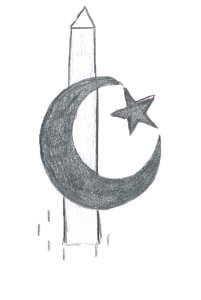
Morgan Kennedy, Staff Illustrator
The United States government accommodates religious and racial differences more peacefully than many other countries. Prejudice does exist, though, and some Americans pay a price. Muslims in America are one minority that does, and their political vulnerability is remarkable.
Muslims are commonly led to believe that they do not belong in the United States as much as other Americans do. Many Muslims can tell stories from their own personal experiences — or those of someone they know — of extra airport and border security, harassment in stores and bullying in schools. Asserting strong opinions on such events can itself increase the chance of a person or group being targeted in some way. For example, the stabbing of Muslim cabdriver Ahmed Sharif in New York in August 2010 demonstrated the physical risks to safety that can follow from being identified as Muslim. Having been made a scapegoate for Sept. 11, a history of bad blood in the Middle East and more general immigration-related anxieties, many Muslims voluntarily concede their rights to political and religious expression in hopes of leading a peaceful life of quiet or lesser spirituality. The pressure to do so has observably increased since 2001.
The First Amendment and subsequent civil rights legislation are not full promises of tolerance and acceptance. Muslim Americans must piece together the conditions for being defined as “modern enough” and not “too radical” so their government views them as people to protect rather than suspect. For example, news broke earlier this year that revealed NYPD surveillance on Muslims living far outside the limits of New York City — including in various college student associations.
Violations of privacy are humiliating, and violations of due process simply terrifying. The U.S. military can indefinitely detain U.S. citizens under the National Defense Authorization Act (NDAA), signed into law last December by President Barack Obama. A few bills have been proposed to reform the NDAA and specify that every U.S. citizen has a right to due process. The Constitution did that in 1791, but the NDAA may have undone it.
If the greater good comes at the cost of a few Americans’ freedoms, it must be asked who specifically stands to profit.
Assessments should constantly be made as to how any political statements about Islam can be expected to result in votes, campaign funds, book sales, news coverage, etc. — all commodities that can be quantified on scales both for furthering policy goals in addition to personal success. Being politically incorrect is a quick and easy way to get attention, and the United States has never quite managed to live up to the ideal of separating church and state anyway.
Attitudes about Islam divide along partisan lines to some degree, illustrating a disadvantage of the two-party system: People and policies are often distorted to fit black-and-white, good-and-evil dichotomies. Questions about Islam and Muslims are helping define competition for the Republican presidential candidacy in 2012. Rick Santorum, Newt Gingrich, Herman Cain and Michele Bachmann have all made statements indicating suspicions toward Islam.
This amounts to deprioritization, if not complete dismissal, of Muslim constituents. Among the Republican presidential candidates, only Mitt Romney and Ron Paul have spoken to uphold the equality of Muslim Americans. Beyond the presidential race in 2012, anti-Shariah legislation has passed in several states and is being debated in still more. The popularity of these laws also has a partisan character. It is worth noting Shariah’s urgency on the list of things that Americans should prohibit through legislation.
Many Muslim Americans limit their own political participation to help make sure their neighbors and government can consider them harmless fellow Americans. But the politicization of Islamic identity continues to cause stress. Whether this fits better into a scheme that makes America safer or a politically-motivated fad of “otherization” should be debated. Anti-Muslim prejudice is hardly an invisible phenomenon, and there is no telling how long Muslim Americans can expect to encounter it. The First Amendment requires that Americans recognize religious freedom, but it regrettably doesn’t explain how.
Ahsan is a member of the class of 2012.


